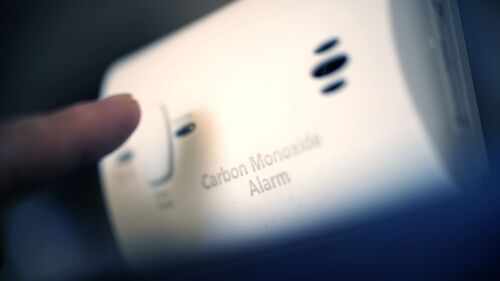By David J. Neal, David Goodhue, Milena Malaver
Miami Herald
MIAMI — Miami-Dade Fire Rescue paramedics took 22 people to local hospitals early Tuesday morning after a water heater leaked carbon monoxide through a West Miami-Dade condo building, sending people into the street in the predawn hours to avoid the deadly gas fumes.
More than 60 people were checked at the Hemingway Villa Condominiums, 9375 SW 40th Terrace, after the 4:44 a.m. call, according to Miami-Dade Fire Rescue.
“Fire crews, including HazMat, began assessing those feeling unwell as a result of a gas leak and carbon monoxide exposure, and started triage for treatment,” fire rescue said.
The fire department’s call list had an “All Clear” on the incident at 7:10 a.m. Residents were allowed back into the two-story building around 9:30 a.m.
Late Monday night, firefighters responded to one call for a sick person, treated that person, and then left, said Danny Cardoso, Miami-Dade Fire Rescue deputy chief of operations.
Soon after, the department received more calls from sick people. At the same time, firefighters responding to the scene noticed their carbon monoxide alarms, which they carry with them, were going off, Cardoso said.
Firefighters eventually found the source of the leak — a gas-powered water heater located in the back of the 27-unit building. They shut it down and began ventilating the building by opening windows and using fans, Cardoso said.
Around 10 a.m. Tuesday, a firefighter entered a transit bus brought to the scene so evacuated residents could wait in air conditioning until cleared to go back home. He told them the building was safe, and the residents cheered.
Jean Carlos Grass, 11, and his mother, Danay Garcia, were awakened by firefighters around 5 a.m.
“If people didn’t wake up and answer the door, they broke the door down,” said Jean Carlos.
His mother said they didn’t smell gas, but she noticed some of her neighbors had lost consciousness. Carbon monoxide is a gas that has no odor, taste or color and kills without warning, according to the Centers for Disease Control and Prevention.
Elba Carrazana, 80, who was returning to her ground-floor unit Tuesday morning, said her 48-year-old son was one of those who passed out from the carbon monoxide poisoning. Paramedics took him to South Miami Hospital, part of Baptist Health South Florida, where Carrazana said he was improving.
“I just spoke with him. He’s getting better,” she said.
“Carbon monoxide is a colorless, odorless, and tasteless gas that is highly toxic and undetectable, which can build up quickly and can linger for hours,” MDFR said in an email. “The best way to protect yourself from carbon monoxide is to install carbon monoxide alarms in your home, and check them every month, and replace their battery when needed.”
The two-story building was built in 1968, Miami-Dade property records say.
Ramses Loaces, 28, was one of the residents who was transported to HCA Florida Kendall Hospital for symptoms of carbon monoxide poisoning.
“I felt kind of weird in the morning, like, you know, a strong headache, a little bit of dizziness and shortness of breath,” said Loaces.
He returned home around 10 a.m.
Loaces has lived in the building since 2019 with his mother, Alina Hernandez, 55. Hernandez is asthmatic and was also transported to HCA Florida Kendall Hospital, but later transferred to South Miami Hospital for further treatment.
As of 2:47 p.m. Tuesday, she remained hospitalized.
“She just got out of the decompression area and is still receiving oxygen,” said Loaces in a text message to the Herald.
Loaces says he noticed something was odd when an upstairs neighbor was taken away by paramedics around 11 p.m. Monday. Still, he slept until he was awakened around 5 a.m. by first responders ordering everyone to evacuate the building.
Property manager Belkis Mirabal, who works for Miami Beach’s Advantage Property Management, said the water heater problem “is something you can’t control.”
Mirabal said, “We already have a plumber on the way and we’re already assessing and addressing the situation.”
Miami-Dade County’s building department inspects water heaters and boilers. It’s unclear when the water heater was last inspected.
©2024 Miami Herald.
Visit miamiherald.com.
Distributed by Tribune Content Agency, LLC.




